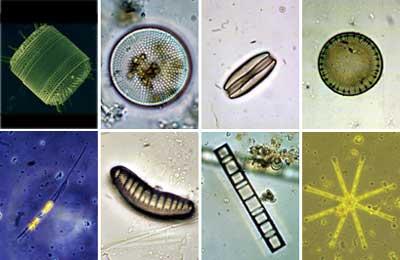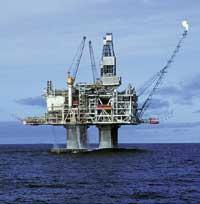A plankton jet to my car

American scientist Jeffrey Dukes and his wife have to travel many miles by car each day to go from home to work at the University of Massachusetts. Concerned about the daily consumption of gasoline, Jeffrey set out to calculate what it really means to fill the car tank.
The ecologist stood in front of a paper and began to add and multiply the numbers. However, since the time of calculation is even more concerned, since you have seen that every time you fill the tank consumes a lot of matter: 100,000 kg.
Gasoline and oil in general are of organic origin. But it is not the derivative of dead dinosaurs, although several popular beliefs have wanted to explain it over and over again. It comes from living beings of much smaller size, invisible by their small size: plankton.
Diatoms, source of oil

Oil occurs when the plankton that inhabits the sea dies and accumulates in deep soil. Most living beings that make up plankton are unicellular, so it is necessary to accumulate an enormous amount of life to form a precious liquid.
Many of these living beings are diatoms, microscopic algae with very beautiful shapes. Rounded, long, starry... there are thousands of different shapes and all more fascinating. These special shapes are obtained thanks to the silica cover that surrounds them. This decorated cover is what makes diatoms, one of the most surprising marine beings.
They live floating in the sea and are food for many animals. But some of these diatoms die in the water and accumulate at the bottom of the sea, until they become stones over time. This plankton takes thousands of years to become viscous oil and millions of plankton units to form some oil. Thus, the world's large oil reserves have been slowly forming, when viscous black liquid has traversed porous rocks from the sea and deposited in underground holes.
Dukes Calculations

Environmentalist Jeffrey Dukes has had to take into account all these factors to carry out his calculations. How plankton is, where it accumulates when it dies and how it becomes oil. In fact, all dead phytoplankton does not accumulate on the earth's surface: only 2% of plankton gets under those thousands of meters stones.
Here, under these rocks, the heat inside the earth accelerates the process of transformation of the accumulated plankton, turning about half of the accumulated plankton into oil over time. Only a small fraction of this oil rises up to the point where human beings can access. And we have about a quarter of that amount going up.
Also taking into account the losses that occur later in transport and in others, the American researcher Jeffrey Dukes managed to make a calculation: only 0.01% of that ancient mass that was in the appropriate place and at the appropriate time finally becomes the oil that we can extract. According to this, all the plants growing on the planet for 400 years would not be enough to produce the fossil fuel we burn annually.
Total dependence

Oil began to form when the Earth was young, and is still in it. But it is not generated at the speed we consume, at all. Oil accounts for about 40% of the total energy consumed in the world. It can therefore be said that modern civilization depends entirely on this matter extracted from the rocky deposits created millions of years ago. Look around you. Most you see comes from oil. What not? Check. You see wood, metal, glass, stone... maybe some living being. The list is long, yes. But everything else is just oil. Paints, resins, synthetic fabrics, plastics, many medicines and others you don't think are petroleum products. Not only the fuel industry, but also the synthetic materials industry, is oil-based.
The population also grows, increasing demand. Oil reserves are becoming smaller and hard to bear. Therefore, many international research projects have been aimed at finding new alternatives. Renewables are one of them, but many believe they will not be able to meet current energy demand. Faced with this, the only solution will be to reduce consumption. But are we willing to endanger our comfortable life?
Published in 7K.
Buletina
Bidali zure helbide elektronikoa eta jaso asteroko buletina zure sarrera-ontzian











